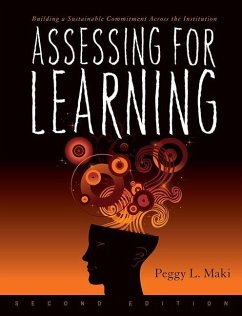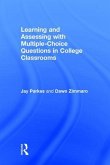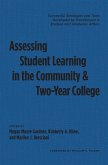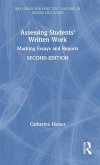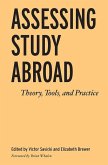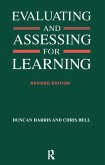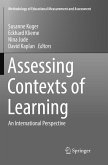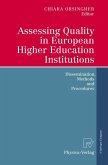- Gebundenes Buch
- Merkliste
- Auf die Merkliste
- Bewerten Bewerten
- Teilen
- Produkt teilen
- Produkterinnerung
- Produkterinnerung
Argues that valid assessment of student achievement is based on assessing the work that students produce along and at the end of their educational journeys, and that assessment needs to be humanized, as opposed to standardized, to take into account the demographics of institutions. This expanded edition also focuses on ways to deepen program and institution-level assessment within the context of collective inquiry about student learning.
Andere Kunden interessierten sich auch für
![Learning and Assessing with Multiple-Choice Questions in College Classrooms Learning and Assessing with Multiple-Choice Questions in College Classrooms]() Jay ParkesLearning and Assessing with Multiple-Choice Questions in College Classrooms212,99 €
Jay ParkesLearning and Assessing with Multiple-Choice Questions in College Classrooms212,99 €![Assessing Student Learning in the Community and Two-Year College Assessing Student Learning in the Community and Two-Year College]() Assessing Student Learning in the Community and Two-Year College191,99 €
Assessing Student Learning in the Community and Two-Year College191,99 €![Assessing Students' Written Work Assessing Students' Written Work]() Catherine HainesAssessing Students' Written Work191,99 €
Catherine HainesAssessing Students' Written Work191,99 €![Assessing Study Abroad Assessing Study Abroad]() Assessing Study Abroad180,99 €
Assessing Study Abroad180,99 €![Evaluating and Assessing for Learning Evaluating and Assessing for Learning]() Chris BellEvaluating and Assessing for Learning180,99 €
Chris BellEvaluating and Assessing for Learning180,99 €![Assessing Contexts of Learning Assessing Contexts of Learning]() Assessing Contexts of Learning110,99 €
Assessing Contexts of Learning110,99 €![Assessing Quality in European Higher Education Institutions Assessing Quality in European Higher Education Institutions]() Assessing Quality in European Higher Education Institutions74,99 €
Assessing Quality in European Higher Education Institutions74,99 €-
-
-
Argues that valid assessment of student achievement is based on assessing the work that students produce along and at the end of their educational journeys, and that assessment needs to be humanized, as opposed to standardized, to take into account the demographics of institutions. This expanded edition also focuses on ways to deepen program and institution-level assessment within the context of collective inquiry about student learning.
Produktdetails
- Produktdetails
- Verlag: Taylor & Francis
- 2nd Revised edition
- Seitenzahl: 356
- Erscheinungstermin: 7. Dezember 2010
- Englisch
- Abmessung: 279mm x 216mm x 30mm
- Gewicht: 1021g
- ISBN-13: 9781579224400
- ISBN-10: 1579224407
- Artikelnr.: 31179029
- Verlag: Taylor & Francis
- 2nd Revised edition
- Seitenzahl: 356
- Erscheinungstermin: 7. Dezember 2010
- Englisch
- Abmessung: 279mm x 216mm x 30mm
- Gewicht: 1021g
- ISBN-13: 9781579224400
- ISBN-10: 1579224407
- Artikelnr.: 31179029
Peggy L. Maki, PhD in literature and linguistics, University of Delaware, writes, speaks about, and consults with higher education organizations and institutions on the process of assessing student learning, an internally motivated and shared commitment to currently enrolled students' equitable progress toward achieving high-quality learning outcomes. She has consulted at over 610 institutions in the United States and abroad and has written books and articles on assessment for more than 20 years. Her previous book, Real-Time Student Assessment: Meeting the Imperative for Improved Time to Degree, Closing the Opportunity Gap, and Assuring Student Competencies for 21st-Century Needs (Stylus, 2017), challenges institutions to prioritize the use of chronological assessment results to benefit enrolled students compared with the more common practice of prolonged assessment cycles that generally benefit future students. She served as the former American Association for Higher Education's (AAHE) senior scholar on assessment; a consultant in the Association of American Colleges & Universities' (AAC&U's) annual General Education and Assessment Institutes; and a member of several advisory boards, including one for the Lumina Foundation. Currently, she serves on the National Institute for Learning Outcomes Assessment (NILOA) advisory board. Recently an accredited organization in the United Kingdom invited her to design and teach online professional development courses and workshops among those it offers worldwide to higher education. She is the recipient of a national teaching award, the Lindback Award for Distinguished Teaching.
Acknowledgements Preface to the Second Edition 1. Developing a Collective Institutional Commitment A Culture of Inquiry
Dialogue about Teaching and Learning across the Institution
Anatomy of the Collaborative Process
Viewing the Process at Work
Planning the Assessment Process Backwards
Who Are Your Students?
What Do You Want to Learn about Your Students' Learning and When Do You Want to Learn?
Principles of an Inclusive Commitment
Identifying Anchors
Accountability
The International Context. The Bologna Process
The Science of Learning
The Scholarship of Teaching and Learning
Disciplinary and Professional Organizations' Focus on Student Learning
Institutional Focus on Learning-Centeredness
Institutional Focus on Becoming a Learning Organization
Roles and Responsibilities across the Institution
Faculty, Administrators, Staff, Students and Other Contributors to Student Learning
An Institution's Principles of Commitment Statement
Higher Education's Ownership 2. Beginning with Dialogue about Teaching and Learning The Continuum of Learning. Beyond an Aggregation of Courses, Credits, and Seat Time
A Focus on Integration
Coordinating Committees
Dialogue Focused on Expectations for Learning
Dialogue Focused on the Design of the Curriculum and Co-Curriculum
Maps and Inventories of Educational Practices
The Design of Our Work 3. Making Claims about Student Learning within Contexts for Learning Learning Outcome Statements
Levels of Learning Outcome Statements
Collaboration to Develop and Review Outcome Statements
Strategies for Developing Outcome Statements
Development of Outcomes-based Syllabi to Promote Enduring Learning
Students' Accountability for Learning 4. Raising and Pursuing Open-Ended Research or Study Questions to Deepen Inquiry Into and Improve Student Learning Beyond the Accountability Fixation
A Problem-Based Approach to Assessing Student Learning
Case 1. Making the Invisible Visible in Physics
Case 2. Shifting to A New Paradigm
Case 3. Changing Multiple Practices
Case 4. Changing Pedagogy to Address Levels of and Obstacles to Learning
The Seeds of a Problem-Based Approach to Assessment
A Scholarly Problem-based Approach to Assessment
Collaborative Tasks in a Problem-Based Assessment Process
Flexible Approaches to the Problem-Based Assessment Process
Three Representative Technology-focused Dissemination Projects
Educators as Lifelong Learners about Their Educational Practices 5. Identifying or Designing Tasks to Assess the Dimensions of Learning The Range of Texts That Demonstrate or Represent Learning
Multiple Methods of Assessment
Direct and Indirect Methods of Assessment
Methods along the Continuum of Learning. Formative and Summative
Points of Learning
Issues of Alignment
Properties of a Method. Validity and Reliability
An Overview of Standardized Instruments and Locally Designed Authentic, Performance-based Methods
An Overview of Technology-enabled Direct and Indirect Assessment Methods
Appendix A. Strategies for Reviewing and Selecting Standardized Instruments
Appendix B. Institutional Example. Goddard College
Appendix C. Goddard College
Appendix D. An Inventory of Traditional and Technology-enabled Direct and Indirect Methods 6. Reaching Consensus about Criteria and Standards of Judgment Interpretation of Student Achievement
Scoring Rubrics
Strategies to Develop Scoring Rubrics
Strategies to Assure Inter-relater Reliability
Threaded Opportunities for Institutional and Student Learning
Appendices. Sample Scoring Rubrics 7. Designing a Cycle of Inquiry A Design for Institutional Learning
Some Key Institutional Contributors
Key Decisions. Determining Your Sample Size, Identifying Times and Contexts for Collecting Evidence, Scoring Student Work and Administering Instruments, Analyzing and Representing Results, Collectively Interpreting Results and Making Decisions, Re-entering the Assessment Cycle
A Narrated Cycle
Development of an Ongoing Commitment
Appendix A. Institutional Example. University of Maryland
Appendix B. Program Assessment Form 8. Building a Core Institutional Process of Inquiry over Time A View of the Whole
Some Representative Structures, Processes, Decisions, Channels and Forms of Communication
Assessment Committees
Offices of Institutional Research and Planning
Processes and Decisions
Channels and Forms of Communication
Resources and Support. Human, Financial, and Educational
Resources and Support. Technological
Locally Designed Assessment Management Systems
Some Representative Commercially Designed Assessment Management Systems
Campus Practices that Manifest an Institutional Commitment
Signs of Maturation
Appendix A. Institutional Example. University of Nebraska-Lincoln
Appendix B. Descriptions of Some Representative Commercially Designed Assessment Management Systems
Appendix C. Consent Form
Dialogue about Teaching and Learning across the Institution
Anatomy of the Collaborative Process
Viewing the Process at Work
Planning the Assessment Process Backwards
Who Are Your Students?
What Do You Want to Learn about Your Students' Learning and When Do You Want to Learn?
Principles of an Inclusive Commitment
Identifying Anchors
Accountability
The International Context. The Bologna Process
The Science of Learning
The Scholarship of Teaching and Learning
Disciplinary and Professional Organizations' Focus on Student Learning
Institutional Focus on Learning-Centeredness
Institutional Focus on Becoming a Learning Organization
Roles and Responsibilities across the Institution
Faculty, Administrators, Staff, Students and Other Contributors to Student Learning
An Institution's Principles of Commitment Statement
Higher Education's Ownership 2. Beginning with Dialogue about Teaching and Learning The Continuum of Learning. Beyond an Aggregation of Courses, Credits, and Seat Time
A Focus on Integration
Coordinating Committees
Dialogue Focused on Expectations for Learning
Dialogue Focused on the Design of the Curriculum and Co-Curriculum
Maps and Inventories of Educational Practices
The Design of Our Work 3. Making Claims about Student Learning within Contexts for Learning Learning Outcome Statements
Levels of Learning Outcome Statements
Collaboration to Develop and Review Outcome Statements
Strategies for Developing Outcome Statements
Development of Outcomes-based Syllabi to Promote Enduring Learning
Students' Accountability for Learning 4. Raising and Pursuing Open-Ended Research or Study Questions to Deepen Inquiry Into and Improve Student Learning Beyond the Accountability Fixation
A Problem-Based Approach to Assessing Student Learning
Case 1. Making the Invisible Visible in Physics
Case 2. Shifting to A New Paradigm
Case 3. Changing Multiple Practices
Case 4. Changing Pedagogy to Address Levels of and Obstacles to Learning
The Seeds of a Problem-Based Approach to Assessment
A Scholarly Problem-based Approach to Assessment
Collaborative Tasks in a Problem-Based Assessment Process
Flexible Approaches to the Problem-Based Assessment Process
Three Representative Technology-focused Dissemination Projects
Educators as Lifelong Learners about Their Educational Practices 5. Identifying or Designing Tasks to Assess the Dimensions of Learning The Range of Texts That Demonstrate or Represent Learning
Multiple Methods of Assessment
Direct and Indirect Methods of Assessment
Methods along the Continuum of Learning. Formative and Summative
Points of Learning
Issues of Alignment
Properties of a Method. Validity and Reliability
An Overview of Standardized Instruments and Locally Designed Authentic, Performance-based Methods
An Overview of Technology-enabled Direct and Indirect Assessment Methods
Appendix A. Strategies for Reviewing and Selecting Standardized Instruments
Appendix B. Institutional Example. Goddard College
Appendix C. Goddard College
Appendix D. An Inventory of Traditional and Technology-enabled Direct and Indirect Methods 6. Reaching Consensus about Criteria and Standards of Judgment Interpretation of Student Achievement
Scoring Rubrics
Strategies to Develop Scoring Rubrics
Strategies to Assure Inter-relater Reliability
Threaded Opportunities for Institutional and Student Learning
Appendices. Sample Scoring Rubrics 7. Designing a Cycle of Inquiry A Design for Institutional Learning
Some Key Institutional Contributors
Key Decisions. Determining Your Sample Size, Identifying Times and Contexts for Collecting Evidence, Scoring Student Work and Administering Instruments, Analyzing and Representing Results, Collectively Interpreting Results and Making Decisions, Re-entering the Assessment Cycle
A Narrated Cycle
Development of an Ongoing Commitment
Appendix A. Institutional Example. University of Maryland
Appendix B. Program Assessment Form 8. Building a Core Institutional Process of Inquiry over Time A View of the Whole
Some Representative Structures, Processes, Decisions, Channels and Forms of Communication
Assessment Committees
Offices of Institutional Research and Planning
Processes and Decisions
Channels and Forms of Communication
Resources and Support. Human, Financial, and Educational
Resources and Support. Technological
Locally Designed Assessment Management Systems
Some Representative Commercially Designed Assessment Management Systems
Campus Practices that Manifest an Institutional Commitment
Signs of Maturation
Appendix A. Institutional Example. University of Nebraska-Lincoln
Appendix B. Descriptions of Some Representative Commercially Designed Assessment Management Systems
Appendix C. Consent Form
Acknowledgements Preface to the Second Edition 1. Developing a Collective Institutional Commitment A Culture of Inquiry
Dialogue about Teaching and Learning across the Institution
Anatomy of the Collaborative Process
Viewing the Process at Work
Planning the Assessment Process Backwards
Who Are Your Students?
What Do You Want to Learn about Your Students' Learning and When Do You Want to Learn?
Principles of an Inclusive Commitment
Identifying Anchors
Accountability
The International Context. The Bologna Process
The Science of Learning
The Scholarship of Teaching and Learning
Disciplinary and Professional Organizations' Focus on Student Learning
Institutional Focus on Learning-Centeredness
Institutional Focus on Becoming a Learning Organization
Roles and Responsibilities across the Institution
Faculty, Administrators, Staff, Students and Other Contributors to Student Learning
An Institution's Principles of Commitment Statement
Higher Education's Ownership 2. Beginning with Dialogue about Teaching and Learning The Continuum of Learning. Beyond an Aggregation of Courses, Credits, and Seat Time
A Focus on Integration
Coordinating Committees
Dialogue Focused on Expectations for Learning
Dialogue Focused on the Design of the Curriculum and Co-Curriculum
Maps and Inventories of Educational Practices
The Design of Our Work 3. Making Claims about Student Learning within Contexts for Learning Learning Outcome Statements
Levels of Learning Outcome Statements
Collaboration to Develop and Review Outcome Statements
Strategies for Developing Outcome Statements
Development of Outcomes-based Syllabi to Promote Enduring Learning
Students' Accountability for Learning 4. Raising and Pursuing Open-Ended Research or Study Questions to Deepen Inquiry Into and Improve Student Learning Beyond the Accountability Fixation
A Problem-Based Approach to Assessing Student Learning
Case 1. Making the Invisible Visible in Physics
Case 2. Shifting to A New Paradigm
Case 3. Changing Multiple Practices
Case 4. Changing Pedagogy to Address Levels of and Obstacles to Learning
The Seeds of a Problem-Based Approach to Assessment
A Scholarly Problem-based Approach to Assessment
Collaborative Tasks in a Problem-Based Assessment Process
Flexible Approaches to the Problem-Based Assessment Process
Three Representative Technology-focused Dissemination Projects
Educators as Lifelong Learners about Their Educational Practices 5. Identifying or Designing Tasks to Assess the Dimensions of Learning The Range of Texts That Demonstrate or Represent Learning
Multiple Methods of Assessment
Direct and Indirect Methods of Assessment
Methods along the Continuum of Learning. Formative and Summative
Points of Learning
Issues of Alignment
Properties of a Method. Validity and Reliability
An Overview of Standardized Instruments and Locally Designed Authentic, Performance-based Methods
An Overview of Technology-enabled Direct and Indirect Assessment Methods
Appendix A. Strategies for Reviewing and Selecting Standardized Instruments
Appendix B. Institutional Example. Goddard College
Appendix C. Goddard College
Appendix D. An Inventory of Traditional and Technology-enabled Direct and Indirect Methods 6. Reaching Consensus about Criteria and Standards of Judgment Interpretation of Student Achievement
Scoring Rubrics
Strategies to Develop Scoring Rubrics
Strategies to Assure Inter-relater Reliability
Threaded Opportunities for Institutional and Student Learning
Appendices. Sample Scoring Rubrics 7. Designing a Cycle of Inquiry A Design for Institutional Learning
Some Key Institutional Contributors
Key Decisions. Determining Your Sample Size, Identifying Times and Contexts for Collecting Evidence, Scoring Student Work and Administering Instruments, Analyzing and Representing Results, Collectively Interpreting Results and Making Decisions, Re-entering the Assessment Cycle
A Narrated Cycle
Development of an Ongoing Commitment
Appendix A. Institutional Example. University of Maryland
Appendix B. Program Assessment Form 8. Building a Core Institutional Process of Inquiry over Time A View of the Whole
Some Representative Structures, Processes, Decisions, Channels and Forms of Communication
Assessment Committees
Offices of Institutional Research and Planning
Processes and Decisions
Channels and Forms of Communication
Resources and Support. Human, Financial, and Educational
Resources and Support. Technological
Locally Designed Assessment Management Systems
Some Representative Commercially Designed Assessment Management Systems
Campus Practices that Manifest an Institutional Commitment
Signs of Maturation
Appendix A. Institutional Example. University of Nebraska-Lincoln
Appendix B. Descriptions of Some Representative Commercially Designed Assessment Management Systems
Appendix C. Consent Form
Dialogue about Teaching and Learning across the Institution
Anatomy of the Collaborative Process
Viewing the Process at Work
Planning the Assessment Process Backwards
Who Are Your Students?
What Do You Want to Learn about Your Students' Learning and When Do You Want to Learn?
Principles of an Inclusive Commitment
Identifying Anchors
Accountability
The International Context. The Bologna Process
The Science of Learning
The Scholarship of Teaching and Learning
Disciplinary and Professional Organizations' Focus on Student Learning
Institutional Focus on Learning-Centeredness
Institutional Focus on Becoming a Learning Organization
Roles and Responsibilities across the Institution
Faculty, Administrators, Staff, Students and Other Contributors to Student Learning
An Institution's Principles of Commitment Statement
Higher Education's Ownership 2. Beginning with Dialogue about Teaching and Learning The Continuum of Learning. Beyond an Aggregation of Courses, Credits, and Seat Time
A Focus on Integration
Coordinating Committees
Dialogue Focused on Expectations for Learning
Dialogue Focused on the Design of the Curriculum and Co-Curriculum
Maps and Inventories of Educational Practices
The Design of Our Work 3. Making Claims about Student Learning within Contexts for Learning Learning Outcome Statements
Levels of Learning Outcome Statements
Collaboration to Develop and Review Outcome Statements
Strategies for Developing Outcome Statements
Development of Outcomes-based Syllabi to Promote Enduring Learning
Students' Accountability for Learning 4. Raising and Pursuing Open-Ended Research or Study Questions to Deepen Inquiry Into and Improve Student Learning Beyond the Accountability Fixation
A Problem-Based Approach to Assessing Student Learning
Case 1. Making the Invisible Visible in Physics
Case 2. Shifting to A New Paradigm
Case 3. Changing Multiple Practices
Case 4. Changing Pedagogy to Address Levels of and Obstacles to Learning
The Seeds of a Problem-Based Approach to Assessment
A Scholarly Problem-based Approach to Assessment
Collaborative Tasks in a Problem-Based Assessment Process
Flexible Approaches to the Problem-Based Assessment Process
Three Representative Technology-focused Dissemination Projects
Educators as Lifelong Learners about Their Educational Practices 5. Identifying or Designing Tasks to Assess the Dimensions of Learning The Range of Texts That Demonstrate or Represent Learning
Multiple Methods of Assessment
Direct and Indirect Methods of Assessment
Methods along the Continuum of Learning. Formative and Summative
Points of Learning
Issues of Alignment
Properties of a Method. Validity and Reliability
An Overview of Standardized Instruments and Locally Designed Authentic, Performance-based Methods
An Overview of Technology-enabled Direct and Indirect Assessment Methods
Appendix A. Strategies for Reviewing and Selecting Standardized Instruments
Appendix B. Institutional Example. Goddard College
Appendix C. Goddard College
Appendix D. An Inventory of Traditional and Technology-enabled Direct and Indirect Methods 6. Reaching Consensus about Criteria and Standards of Judgment Interpretation of Student Achievement
Scoring Rubrics
Strategies to Develop Scoring Rubrics
Strategies to Assure Inter-relater Reliability
Threaded Opportunities for Institutional and Student Learning
Appendices. Sample Scoring Rubrics 7. Designing a Cycle of Inquiry A Design for Institutional Learning
Some Key Institutional Contributors
Key Decisions. Determining Your Sample Size, Identifying Times and Contexts for Collecting Evidence, Scoring Student Work and Administering Instruments, Analyzing and Representing Results, Collectively Interpreting Results and Making Decisions, Re-entering the Assessment Cycle
A Narrated Cycle
Development of an Ongoing Commitment
Appendix A. Institutional Example. University of Maryland
Appendix B. Program Assessment Form 8. Building a Core Institutional Process of Inquiry over Time A View of the Whole
Some Representative Structures, Processes, Decisions, Channels and Forms of Communication
Assessment Committees
Offices of Institutional Research and Planning
Processes and Decisions
Channels and Forms of Communication
Resources and Support. Human, Financial, and Educational
Resources and Support. Technological
Locally Designed Assessment Management Systems
Some Representative Commercially Designed Assessment Management Systems
Campus Practices that Manifest an Institutional Commitment
Signs of Maturation
Appendix A. Institutional Example. University of Nebraska-Lincoln
Appendix B. Descriptions of Some Representative Commercially Designed Assessment Management Systems
Appendix C. Consent Form

